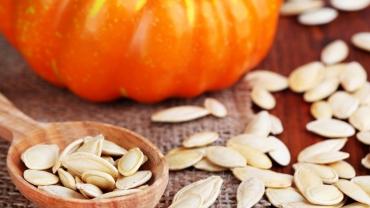
Pumpkin seeds also known as pepitas have gained quite a bit of popularity. Roasting pumpkin seeds has become a notable tradition especially throughout the Halloween and Thanksgiving seasons. But these delicious seeds can also be enjoyed raw or roasted unhulled or naked salted or plain. In any form they are certainly among the elite of all seeds.
Nutritional Profile
One nutritional element that sets pumpkin seeds apart from their clan is the tremendous amount of protein they offer. At 7 grams per ounce pumpkin seeds become an important source of plant-based protein.
The seeds are also an excellent source of critical minerals. They supply 42% of the RDA of manganese an important nutrient for bone metabolism antioxidant function and cognitive health. Each ounce of pumpkin seeds offers 150 mg of magnesium one of the most deficient nutrients in our diets and an underlying problem in multiple health concerns. Phosphorus iron and copper are found in significant amounts aiding in the body’s antioxidant systems and making pumpkin seeds a good tool for those struggling with anemia. Finally pumpkin seeds are a good source of vitamin K supplying 18% of the RDA.
In addition to vitamins and minerals pumpkin seeds provide a variety of phytonutrients including phenolic acids carotenoids phytosterols and squalene which are shown to exert numerous therapeutic properties such as antioxidative hypoglycemic anticancer antihypertensive cardioprotective antilipemic gynoprotective and anthelmintic.
Blood Sugar Management
It would be wise to include pumpkin seeds as a regular component of any dietary plan aiming to normalize blood sugar levels due to their hypoglycemic affect. Studies have identified macromolecules in pumpkin seeds such as trigonelline (TRG) nicotinic acid (NA) and D-chiro-inositol (DCI) which possess hypoglycemic properties and could assist in maintaining glycemic control. Their high antioxidant value and crude fiber content (found to be 31.48%) further contribute to their ability to modify blood sugar. Studies have also shown a significant amelioration of glycemia insulinemia and lipid dysmetabolism and a reduction in oxidative markers when diabetic rats are fed raw pumpkin seeds.
Cholesterol Levels
Pumpkin seeds are useful for combating atherosclerosis and improving other metabolic factors associated with heart health. When the diets of atherogenic rats were supplemented with pumpkin seeds for 37 days they showed a 48 percent decrease in total cholesterol and a 79 percent decrease in LDL cholesterol. Moreover HDL cholesterol rose significantly with pumpkin seed consumption. Initially researchers assumed this cardio-protective effect was due to the high amounts of arginine present in pumpkin seeds but control groups supplemented with arginine in drinking water did not show the same cholesterol improvements. Researchers instead suggested the unique fatty acid composition of pumpkin seeds which includes palmitic acid and linoleic acid may explain their positive effect on cholesterol levels.
Wound Healing
The oil of pumpkin seeds is a rich source of bioactive components with incredible wound healing properties. When pumpkin seed oil was used on biopsy wounds in rats morphometric assessment and histological findings revealed “full re-epithelialization with reappearance of skin appendages and well organized collagen fibers without inflammatory cells.” These findings were not apparent in the control group. Similar studies using biopsies on rats confirm pumpkin seed oil “significantly increases the collagen production 64.9% ± 5.94.”
Antihelmintic Properties
Pumpkin seed extract is useful for fighting nematodes in humans a rising problem as these organisms become increasingly resistant to traditional therapies. In vitro and in vivo studies of Curcubita pepo extract showed anthelmintic action on egg hatching larval development and adult worms’ motility. Nitrogen-containing compounds may be responsible for the larivicidal and ovicidal properties while alkaloid compounds reduce nematode motility.
Benign Prostatic Hyperplasia
The extract of pumpkin seeds has often been utilized in the management of lower urinary tract symptoms related to benign prostatic hyperplasia (BPH) as well as for controlling cell growth in cancerous prostate cells. A review of 16 studies revealed strong anti-inflammatory and antiandrogen effects evidenced by a reduction in prostate growth and detrusor activity improvement in International Prostatic Symptoms Score (IPSS) and uroflowmetry parameters. Cell viability tests with prostate cancer cells and a hyperplastic cell line from benign prostate hyperplasia tissue showed cell growth inhibition of approximately 40-50 percent with pumpkin seed extract.
Much more than a nutritious snack or a holiday treat pumpkin seeds offer an array of health benefits that puts them at the top of the nuts and seeds list. And they are quite tasty as is evidenced by the vast variety of autumn recipes that feature these unique seeds from salads to soups to pesto; even breads and muffins Paleo-style.